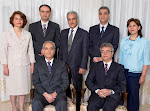
The document that many have been waiting for was finally published in the 14 April 2009 edition of
Al-Waqa’eh Al- Massreyah [The Egyptian Gazette/Chronicles], which is the long-standing official journal where all laws must be published before their actual implementation. [see
EIPR/Human Rights Watch joint press release
here, also see story in
BWNS here]
This decree by the Ministry of Interior is of profound historical significance, mostly because it contains a vital amendment of an older order issued in 1995 regarding the enforcement of Civil Status Law of 1994.
In short, this decree allows anyone who does not belong to one of the three approved religions in Egypt (Judaism, Christianity & Islam) to obtain identification documents with dash (-) in place of religion.
The published text of the decree was initially dated 19 March 2009, three days following the
decision by the Supreme Administrative Court to uphold the lower court’s ruling allowing the Baha’is to obtain identification documents (birth certificates, IDs, etc…) with dash (-) instead of a stated religion. It also states that the decree is to be enforced the following day after its publication.
Since it was published in
Al-Waqa’eh Al-Massreyah on 14 April, its implementation was supposed to begin on 15 April 2009. The law does not mention the word “Baha’i,” thus leaving the door open to anyone who does not belong to one of the three religions to apply for documents under these conditions.
The decree, signed by the Minister of Interior
Habeeb El-Adly, states:
After reviewing law-143 of 1994 regarding civil status and its amended order-1121 of 1995, it is decreed that at the end of Article-33 of the 1995 order, the following is added: “and it must enter the sign (-) in the religion field for Egyptian citizens who were previously recorded, or acquired, or obtained, or their fathers [obtained] identification documents in which none of the three religions were stated, or if the sign (-) was placed in the religion field, or [in such cases] requiring enforcement of court orders that needed such implementation….”
This decree of the Ministry of Interior stipulates that the request for such documents must be submitted by those concerned to the Assistant Minister of Interior for the Civil Status authority, or to those deputized by him, and that it will be recorded in its specified register.
The office of civil status in Cairo is beginning to implement the order and is making arrangements to apply the necessary computer modifications that will allow the printing of these documents. It appears that, so far, this central office in Cairo will be handling all cases and has already received requests from a couple of individuals. Their documents should be issued as soon as the computer software modifications have been implemented. The process is expected to be gradual and orderly, and might take time to process all applicants.
Ironically, yesterday, a complaint was filed by a representative of al-Azhar’s Islamic Research Council, known for its open opposition to the Baha’is, requesting that the law be reversed and that Baha’is be stripped of their Egyptian citizenship. Clearly this is a frivolous challenge which has nowhere to go. The Islamic Research Council in its desperate move has shown how absurd its strategy is, which will only lead it to a dead end. In its rush to challenge the order, it failed to notice one simple fact: the Ministry of Interior order is for all Egyptian citizens affected by its conditions; it does not mention Baha’is anywhere in its text. It must be realized that the Ministry of Interior is above such tactics and after all its hard work in finding a solution to the identity crisis, it does not intend to retreat from its move towards normalization of the status of the citizens of Egypt.

A few days ago, I took a taxi ride with
Dr. Raouf Hindi, the one who was awarded the Supreme Court verdict on behalf of his twin children allowing them birth certificates, and who now dons a head cap and dark sunglasses on his outings. Even with his disguise, this was the second time on the same day when a taxi driver recognized him and asked him if he obtained the identity documents with dashes yet. The driver said that he has been following the Baha’i cases quite regularly and that, along with his family and friends, they watch the TV programs about the Baha’is while congregated in groups. He said that no one should be forced to change his religion and that everyone is entitled to his own belief. He also expressed his dismay at the
Showraniyah burning. The man was extremely friendly and eager to hear more about the Baha'is. He was genuinely interested and not merely curious. This is just an example of random unsolicited opinions in the streets of Cairo. Undoubtedly many more are out there.
The Baha’is of Egypt are eager to obtain their identity documents so that they can join their fellow citizens in continuing to serve their homeland and to contribute to the welfare of their society. By reaching this milestone, they will move towards being integrated in the fabric of the Egyptian society, and not unlike many of their coreligionists are in over 200 countries worldwide. The issue is indeed about service regardless of religious affiliation.
These Egyptian citizens love their country and are longing for it to love them back. This bold move by the Ministry of Interior propels them towards that.
 There appears to be some imminent positive prospects for the displaced Baha'i families of Showraniyah, the southern Nile village in the province of Sohag recently known for the burning of Baha'i homes.
There appears to be some imminent positive prospects for the displaced Baha'i families of Showraniyah, the southern Nile village in the province of Sohag recently known for the burning of Baha'i homes.
























